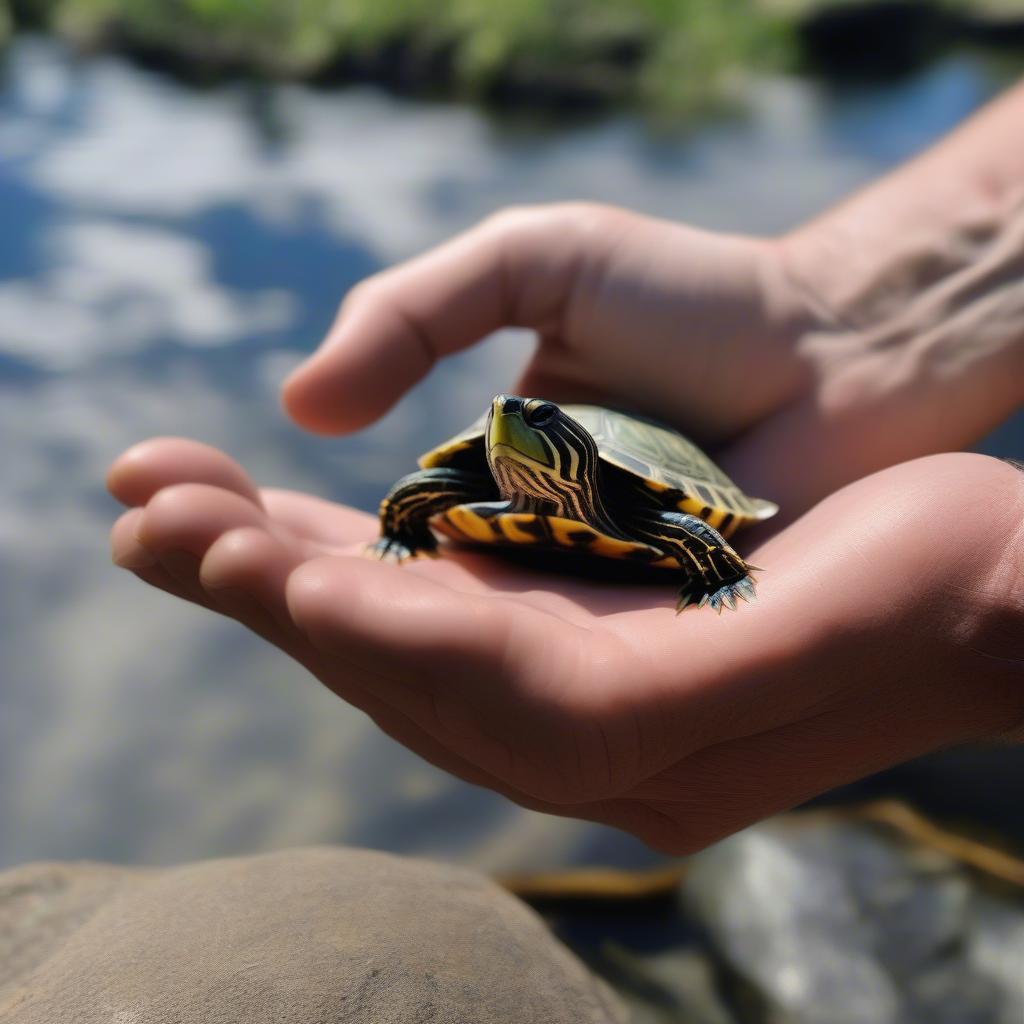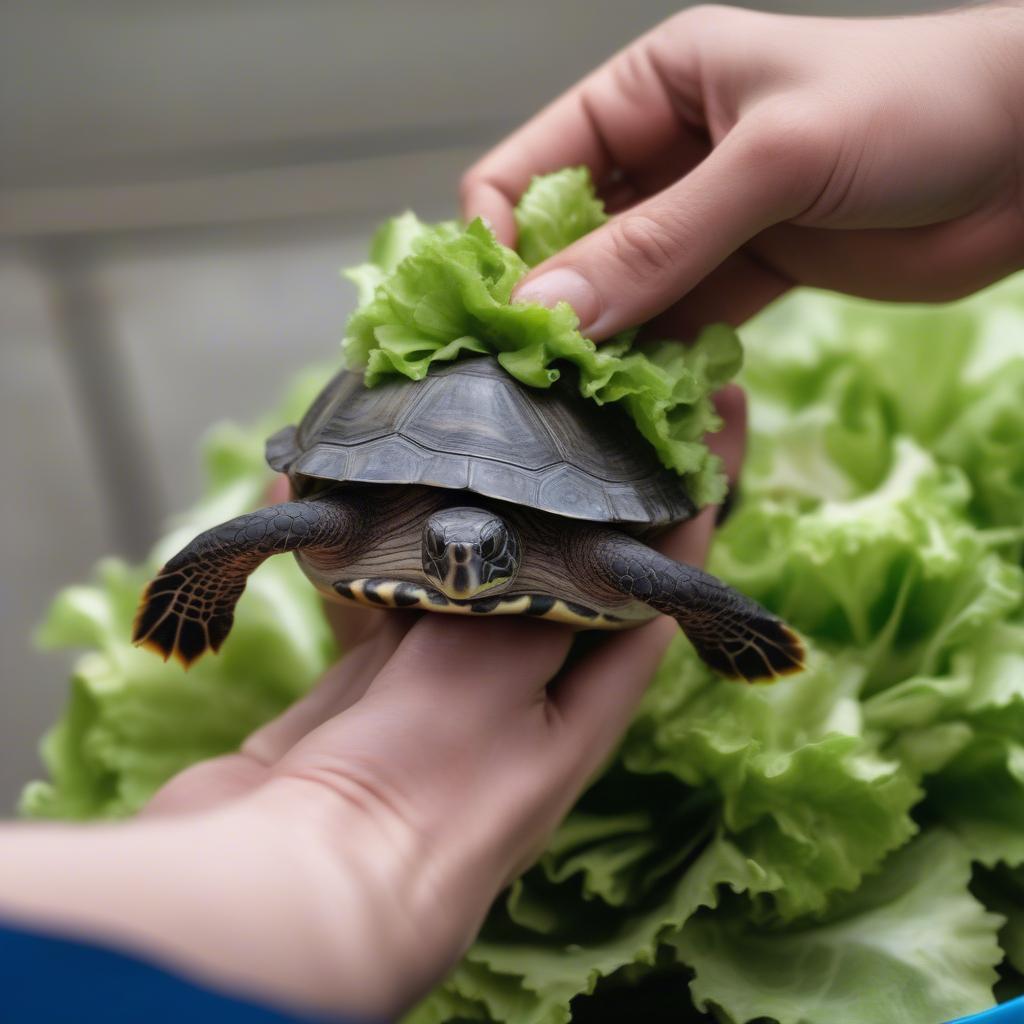Do Turtles Love Their Owners? It’s a question that often crosses the minds of those captivated by these shelled reptiles. While their expressions might seem stoic, understanding turtle behavior can reveal a fascinating world of subtle cues and complex interactions. This article explores the nuanced ways turtles interact with their human caregivers, delving into the science behind their behavior and addressing common misconceptions about reptile affection.
Understanding Turtle Behavior: Beyond the Shell
Turtles, unlike dogs or cats, don’t display affection in overtly demonstrative ways. Their communication is subtle, often relying on body language and environmental cues. Recognizing these nuances is key to understanding their responses to human interaction. While they may not cuddle or purr, turtles can and do develop positive associations with their owners, often exhibiting signs of recognition and comfort in their presence.
Signs of Recognition and Comfort
- Basking in your presence: A turtle choosing to bask near you can indicate a sense of security and comfort in your presence. They associate you with a safe and stable environment.
- Following your movements: Some turtles might follow their owners around, particularly if they associate them with food. This isn’t necessarily affection, but a learned behavior indicating a positive association.
- Coming to the front of the enclosure: When you approach, does your turtle come to the front of their enclosure? This could indicate anticipation of interaction or feeding, suggesting a positive association with your presence.
- Accepting food from your hand: While not necessarily affection, accepting food from your hand signifies trust and a lack of fear.
 Turtle Basking Near Owner
Turtle Basking Near Owner
Do Turtles Feel Affection? A Scientific Perspective
The concept of “love” in reptiles is complex and differs significantly from mammalian expressions of affection. Reptiles, including turtles, have a more primitive limbic system, the part of the brain associated with emotions. This doesn’t mean they don’t experience emotions, but their range and expression are different. They are capable of forming associations, recognizing their caregivers, and experiencing states like fear, stress, and contentment.
The Role of Imprinting
Some turtle species exhibit imprinting, a process where young animals develop a strong attachment to the first creature they encounter. This is more common in certain species like tortoises. While not quite “love,” imprinting establishes a powerful bond and recognition.
The Importance of Consistent Care
Consistent positive interactions, such as providing proper care, a stimulating environment, and regular feeding, can foster positive associations in turtles. This contributes to their overall well-being and can lead to behaviors that might be interpreted as signs of affection.
 Turtle Eating from Hand
Turtle Eating from Hand
Debunking the Myth of Turtle Indifference
While turtles might not express affection like furry companions, dismissing their capacity for complex interaction is a misconception. Their subtle cues and learned behaviors reveal a fascinating world of reptile communication. Understanding these nuances can deepen the bond between turtle owners and their shelled companions.
Recognizing Individual Personalities
Just like any animal, turtles have individual personalities. Some are more outgoing and interactive, while others are more reserved. Recognizing these individual differences is key to understanding their unique ways of expressing themselves.
Do Turtles Love Their Owners? A Nuanced Answer
Do turtles love their owners in the same way a dog or cat might? Probably not. However, they can and do develop positive associations, recognizing their owners and exhibiting signs of comfort and trust. While their expressions of “affection” might be subtle, understanding their behavior reveals a fascinating world of reptile-human interaction.
 Turtle in Enriched Environment
Turtle in Enriched Environment
Conclusion: Building a Bond with Your Turtle
While the question, “do turtles love their owners?” remains complex, the ability to form positive associations is undeniable. By understanding their subtle communication cues and providing consistent, enriching care, you can foster a strong bond with your turtle companion, enriching both your lives and theirs.
FAQ
- Can turtles recognize their owners? Yes, turtles can learn to recognize their owners through visual and olfactory cues.
- Do turtles show affection? Turtles show affection differently than mammals, expressing comfort and trust through subtle behaviors.
- How can I bond with my turtle? Consistent care, a stimulating environment, and gentle interaction can foster a positive bond.
- Do turtles get lonely? Turtles are generally solitary animals but can benefit from an enriched environment.
- How long do turtles live? Turtle lifespan varies depending on the species, with some living for several decades.
- What do turtles eat? Turtle diet varies by species, including vegetables, fruits, insects, and commercial turtle food.
- How do I know if my turtle is happy? A healthy appetite, active behavior, and basking are signs of a happy turtle.
Need more help? Contact us at Email: contact@daiduongtranhba.com, or visit our office at Michigan Ave, Suite 3100, Chicago, IL 60611, USA. We have a 24/7 customer support team ready to assist you.

